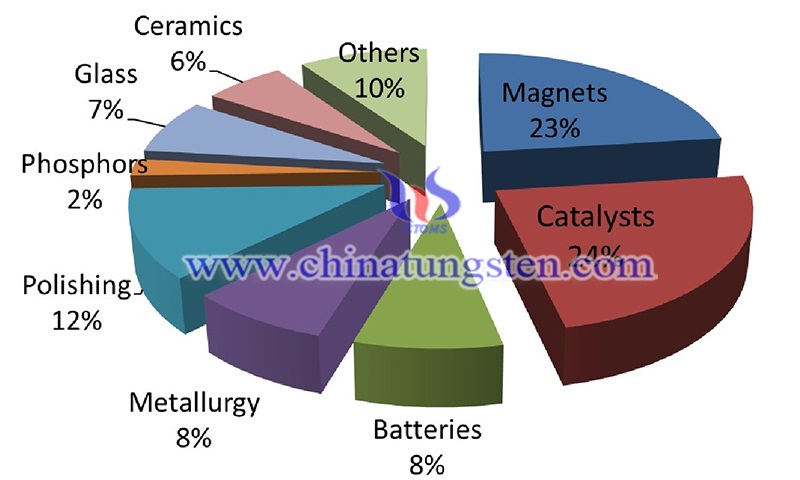Upcoming Competition Over Rare Earths: Strategies of US, and EU
- Details
- Category: Tungsten's News
- Published on Monday, 08 November 2021 19:39
Currently, China accounts for about 70% of global mining of rare earths and 85% to 90% of their processing. For the EU, China provides 98% of its supply needs. This is an issue of concern, which is too dependent on one country to supply materials such as neodymium, praseodymium, dysprosium and terbium, and is also a concern for the US.
China, for reasons clearly related to the uncompetitive production costs with the rest of the world, has a monopoly on production and supply, which has led to the closure of many rare earth quarries in Western countries. In 2017, the country produced 105,000 tons of rare metals, equivalent to 81% of global production. The other two major producers are Australia and Russia (with the second largest rare earth reserves in the world), with 20,000 tons and 3,000 tons, respectively.
The United States is getting worried. Once the leader in rare earth production and trade, the United States handed the reins to China in the 1990s. China declared rare earths a "protected strategic material" and proceeded to control production and processing, impose export quotas, and attempt to dominate the supply chain for key applications.
Since then, China has created higher market values for these elements, developed technological know-how, and attracted high-tech companies using rare earth to produce their final products domestically. China continues to consolidate and strengthen its dominant position in the rare earths industry. This has led the United States to relinquish its position as the leading researcher in the field. The erosion of technological expertise is considered more problematic than the resumption of production in the US, as China dominates all other steps in the rare earth supply chain.

In 2020, China produced 140,000 tons of rare earth elements, while the US produced only 38,000 tons. on February 24, 2021, Biden signed an executive order aimed at boosting manufacturing jobs by strengthening the U.S. supply chain for advanced batteries, pharmaceuticals, critical minerals, and semiconductors.
The U.S. Department of Defense (DOD) announced an investment to expand the largest rare earth element mining and processing company outside of China to provide the necessary raw materials to help combat the climate crisis.
The United States has also decided to establish a working group comprised of agencies such as the Department of Agriculture (USDA) and the Environmental Protection Agency (EPA) to identify locations where critical minerals can be produced and processed in the United States while complying with the highest environmental, labor and sustainability standards. The scope of work of the working group is to expand sustainable, responsible production and processing of critical minerals in the United States.
For EU, one option for Europe is to develop an 'alternative' strategy, i.e. to develop stand-alone alternative technologies for these rare metals. The technical challenges are enormous, but 'selectively' possible in some areas. In the absence of 'raw materials', there will be a need for 'gray matter' and for focusing huge research resources on selective topics. The development of asynchronous motors without rare metals is an example. Research on energy storage must favor those batteries for which materials and components are available within Europe.
The recycling of materials also opens up interesting prospects, for which new resources need to be mobilized, but we must not forget that the price of recycling is often higher than the purchase price of certain raw materials.
However, putting the strategic plan into practice through priorities and clear decisions is still the most difficult step. National interests must be left behind and cooperation agreements must be established between European institutions, national authorities and the private sector. EU's future will depend on its ability to build a true raw materials alliance. There is no doubt that key minerals will provide the impetus for high-tech manufacturing and renewable energy transformation. The question is how the world will respond to this coming competition for rare earths.
- Rare Earth Manufacturer & Supplier, Chinatungsten Online: www.chinatungsten.com
- Tungsten News & Prices of China Tungsten Industry Association: www.ctia.com.cn
- Molybdenum News & Price: news.molybdenum.com.cn
- Tel.: 86 592 5129696; Fax: 86 592 5129797; Email: sales@chinatungsten.com



 sales@chinatungsten.com
sales@chinatungsten.com